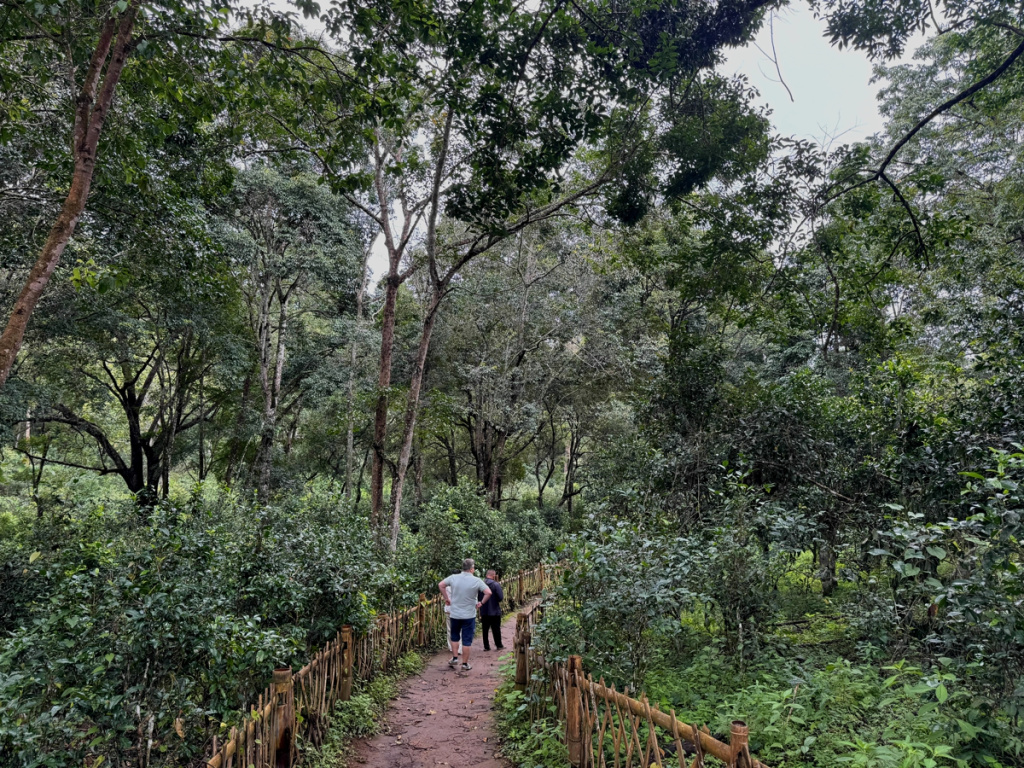Forest Tea: A Forest Treasure in Your Cup
Forest tea (Chinese: 林下茶, pinyin: Lín xià chá) is a unique drink grown not on open plantations, but under the forest canopy. The trees create natural shade and a special microclimate, which has a significant impact on the taste and aroma of the tea.
Forest tea usually grows in the forest. Tea lovers know that the unique qualities of tea are largely determined by its ecological conditions. It can be said that behind each cup of pure and individual good tea there is a reflection of nature.
The climate and soil conditions in the forest are ideal for growing tea bushes. Tea plants love shade, and the surrounding trees provide them with protection from direct sunlight and wind, and also help resist pests and diseases, promoting the growth and development of tea bushes.
Features of tea leaves
Undergrowth tea usually has a unique taste and aroma. Due to special growing conditions and long growth, tea bushes completely blend with the surrounding environment, and tea leaves can absorb the aromas of surrounding plants, mosses, stones and other forest elements.
For example, these can be flowers, mosses, stones, which coexist with tea bushes for a long time. Tens, hundreds or even thousands of years of such harmonious coexistence allow tea to absorb the aromas of the environment. When such tea is brewed, these aromas are transferred to the infusion, creating a feeling of immersion in the forest for tea lovers.
In addition, most tea bushes growing in the forest are old and usually grow slowly. This allows them to accumulate more nutrients, making the tea leaves more elastic, aromatic and rich in taste.
Why is forest tea so special?
- Natural Environment: Tea bushes growing in the forest are exposed to natural factors such as rain, wind, sunlight penetrating through the tree canopies. This gives the tea its unique character.
- Slow growth: In forest conditions, tea bushes grow more slowly than on plantations. This allows them to accumulate more useful substances, which has a positive effect on the quality of the finished drink.
- Interaction with nature: Tea leaves absorb the aromas of surrounding plants, mosses, and soil. Due to this, each variety of forest tea acquires its own unique bouquet of taste and aroma.
- Eco-friendliness: Growing tea in the forest does not require the use of large amounts of chemical fertilizers and pesticides, making it a more environmentally friendly product.
The taste and aroma of forest tea
The taste of forest tea is soft, deep and multifaceted. It can contain notes of flowers, fruits, nuts, wood and even earth. The aroma of tea is often compared to the aroma of a forest after rain.
Ecological significance
The method of growing tea under the forest canopy greatly contributes to environmental protection. Tea bushes growing together with other forest plants form an excellent ecosystem, helping to preserve biodiversity.
Cultural value
In some areas of Yunnan, tea grown under the forest canopy has a very high cultural value. For example, Jingmai Mountain in Yunnan has the best preserved, oldest and most extensive artificially cultivated ancient tea forests in the world, which are rightly considered a "museum of the natural history of the tea tree."
Those who have visited Jingmai (Chinese: 景迈山, pinyin: Jǐng mài shān) are sure to be enchanted by the unique ancient tea forests, well-preserved ancient villages, the harmonious ecosystem where tea and forest coexist, and the simple manners and customs of the local people such as the Bulan and Dai. It is not just a secluded corner of nature and an agricultural landscape, but also an integral part of the culture of these minorities.
Types of undergrowth tea
There are many varieties of undergrowth tea, each with its own unique characteristics. Some of the most famous varieties are:
- Pu-erh: A Chinese tea that is often grown in forested environments, Pu-erh is renowned for its deep flavor and ability to improve over time.
- Da Hong Pao: A Chinese oolong tea grown in the Wuyi Mountains, this tea is prized for its rich flavor and aroma, which combines floral and fruity notes.
- Baihao Yinzhen: A Chinese white tea that is also grown in forests, Baihao Yinzhen has a delicate flavor and aroma.
Health benefits
Podlesny tea, like any other tea, is rich in antioxidants that help fight free radicals and slow down the aging process. In addition, it contains vitamins, minerals and other useful substances that have a beneficial effect on the body.
Podlesny tea is not just a drink, it is a real treasure of nature. Its unique taste and aroma, as well as its environmental friendliness, make it increasingly popular among tea connoisseurs.
- Комментарии
- Вконтакте





